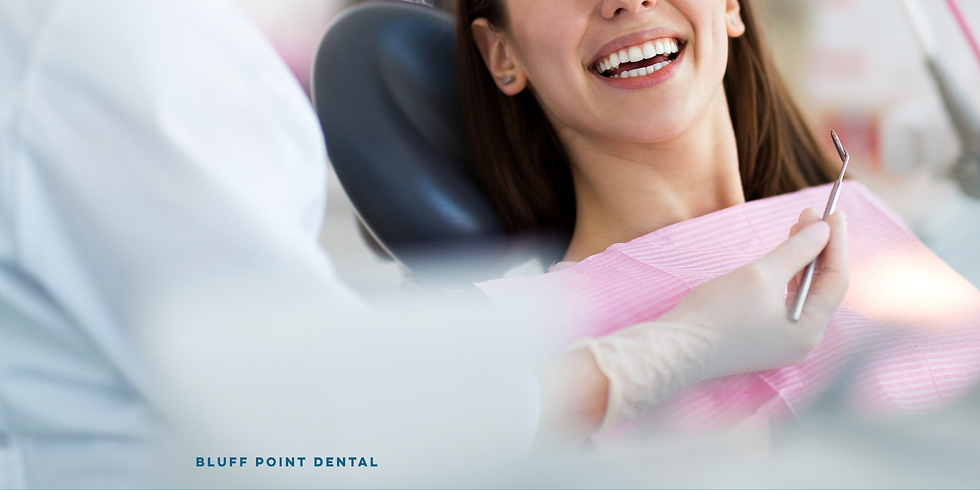Tooth Pain After Dental Filling - Is it Serious?
- Bluff Point Dental

- Oct 28, 2025
- 3 min read
Updated: Feb 2
If you’ve recently had a dental filling, you could possibly experience some sensitivity in and around the filled tooth. Pain in the days following your filling can be very common and usually subsides on its own, but in rare cases, you may need to get your dentist to check it out in case it is something more serious.
Why Do My Teeth Hurt After a Filling?
Sensitivity after a dental filling is normal and part of the body’s way of healing itself.
The process of getting a filling involves removing the decay from your tooth and replacing it with filling material - most commonly composite resin or metal filling. The cavity may come close to the nerves inside your tooth and this may cause irritation, sensitivity, and increased pressure in the pulp (nerve and blood supply areas).
The filled tooth and surrounding area can then feel sensitive to hot and cold temperatures from both food and beverages. The sensitivity should go away within a few days, but you should avoid consuming anything too hot or cold within the first few days of treatment.
Discomfort can also come from your bite feeling misaligned and may feel as though your jaw isn’t sitting right. Some mild discomfort is normal, particularly as your mouth gets used to having the additional filling - this will feel strange at first but you’ll get used to it over time.

Common tooth pain triggers after a filling:
Hot and cold food and drink
Sugary and acidic food and drink
Hard and sticky foods
Using a toothbrush which is too firm
Food getting stuck between your teeth
Uncomfortable bite alignment
How Long Does Pain Last After a Filling?
Tooth pain is common in the first few days after a filling and will (typically) disappear within a week. If the pain persists or gets worse, it’s important to go back to your dentist, who can examine your filling and identify any issues that may be causing abnormal pain.
Steps to Reduce Pain After Dental Filling
While tooth pain after a filling can be uncomfortable and inconvenient, there are home remedies and over-the-counter products that can help alleviate symptoms:
Taking OTC medication like ibuprofen or paracetamol to ease pain
Salt water rinses to clean your mouth and reduce inflammation - just dissolve half a teaspoon of salt in warm water, gargle for 30 seconds, and repeat a few times a day
Use desensitising toothpaste and a soft toothbrush
Avoid hard, sticky, and very hot or cold foods
Maintain good oral hygiene - brush your teeth twice a day and floss

How to Know Whether It’s Serious
While tooth pain after a filling is common, there are some cases where it could indicate something more serious.
If you are experiencing agonising pain, swelling, or redness which persists for more than a few days, it’s important that you go back to your dentist to address these issues. It is rare, but pain can indicate complications from the filling, such as:
Nerve irritation - In cases, deep drilling is required for the filling to be placed, the nerves inside the tooth can become exposed, irritated, or damaged. If severe damage occurs, root canal therapy or tooth extraction may be required.
Bacterial infections or abscesses - When the sensitive interior of the tooth is exposed, infections or abscesses can occur. They must be treated as soon as possible to prevent the infection spreading and leading to more serious problems.
Broken or chipped filling material - A chipped filling is not usually an emergency, but it can worsen it over time so it is important to get it resolved as soon as possible.
Allergic reaction - metal fillings or composite resin can sometimes cause a very rare allergic reaction, resulting in swelling, redness, and a burning sensation. Your dentist can help identify whether you are allergic to the filling and replace the material with a hypoallergenic alternative.

When to See a Dentist
If pain persists and you suspect signs of an infection (redness, swelling, itchiness, burning) you should contact your dentist as soon as possible.
Bluff Point Dental are Geraldton’s leading dentists. If you’re dealing with unexplained pain or discomfort, book an appointment with our dentists and we will examine your dental filling and help diagnose any issues.
If you require urgent treatment, we offer emergency dental appointments for a range of dental issues, including tooth fillings. To arrange an emergency consultation with our team, call us on 08 9943 8484.



Comments